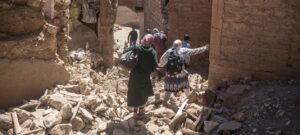Morocco Earthquake Leaves Devastation and Calls for International Support
As the earthquake struck on Friday evening, people fled their homes in panic, and buildings were destroyed. Survivors share their experiences of the first hours.
Late on Friday night, shortly after 11 pm local time in Marrakesh, hotels, restaurants, and cafes were bustling with activity. Many people were enjoying the evening, the start of the weekend. But suddenly, lamps started swinging, hitting the walls, and the ground began to shake.
Many had to comprehend what was happening, just like Moulay Hafid Mouddan. He had just left a restaurant with his wife to take a stroll through the streets of the desert city, as he told the French news agency AFP: “After our dinner, my wife and I went out onto the street for a walk, and shortly after, we felt a tremor beneath our feet. My wife thought it was a helicopter or something. There was shaking, and suddenly people were running in all directions through the streets.”
According to earthquake monitors, a 6.8 to 6.9 magnitude earthquake on the Richter scale has hit the region. Its epicenter lies between the tourist hubs of Marrakesh inland and Agadir on the Atlantic coast. However, the tremors were felt far beyond, even reaching the capital Rabat, approximately 500 kilometers away.
In Marrakesh, people fled their often very old houses in panic. Parts of the famous red wall surrounding the old city collapsed, debris littered the streets, and the minaret of a historic mosque was damaged.
The famous Djema El-Fna square, where musicians, vendors, and jugglers entertain visitors during the evening, has turned into a makeshift sleeping place for many – out of fear of aftershocks, resident Faisal Baddour revealed at night in Marrakesh. “The strength and intensity of this earthquake were felt in our building. It shook three times. People ran out onto the street in complete panic.” It was as if a train had rushed past their homes.
Initially, reports mentioned around 300 deaths on Saturday morning, but the numbers continued to rise throughout the day. According to the government’s evening statement, at least 2,000 people have lost their lives, with over 2,000 reported injured. The rural areas between Marrakesh and Agadir seem to be the most severely affected. Rescue workers and aid have difficulties reaching every location promptly, and the situation remains chaotic. Online pleas for help have emerged, with people stating that their loved ones are still trapped under the rubble.
The European Union has already pledged assistance, although the Moroccan government has not yet officially requested international aid.
In the village of Amizmiz, located 60 kilometers south of Marrakesh, a makeshift tent has been set up amidst a field of debris. It consists of wooden poles and a tarpaulin, providing shelter for around 30 people, mainly women and children, seeking shade from the sun.
A woman stands nearby, surrounded by houses with massive cracks and partial collapse. She describes the situation to a Moroccan online magazine, explaining that the children are now homeless, people have no place to live, and the houses have collapsed. “The people here are poor, look around,” she says. “Everything is destroyed; people are already clearing their houses, and there are human losses too.” She mentions that a neighboring town has suffered even worse, with many dead and injured: “They are still pulling people out from under the debris.” Another place is completely destroyed. There are people who have nothing to eat. Poor individuals are profoundly affected. “We pray to God and our king to help us and show us mercy.”
The Moroccan government has not yet requested international assistance, but the European Union has already pledged support.


